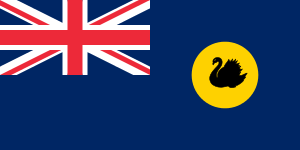Western Australian state election, 1968
Western Australian state election, 1968

|
| 23 March 1968 (1968-03-23) |
|
|
|
|
|
Elections were held in the state of Western Australia on 23 March 1968 to elect all 51 members to the Legislative Assembly and 15 members to the 30-seat Legislative Council. The Liberal-Country coalition government, led by Premier Sir David Brand, won a record fourth term in office against the Labor Party, led by Opposition Leader John Tonkin.
Results
Legislative Assembly
|
Western Australian state election, 23 March 1968
Legislative Assembly
<< 1965 — 1971 >> |
| Enrolled voters |
359,790[1] |
|
|
| Votes cast |
331,325 |
|
Turnout |
92.09% |
–0.24% |
| Informal votes |
10,255 |
|
Informal |
3.10% |
–0.01% |
| Summary of votes by party |
| Party |
Primary votes |
% |
Swing |
Seats |
Change |
| |
Labor |
145,605 |
45.35% |
+2.71% |
23 |
+ 2 |
| |
Liberal and Country |
141,271 |
44.00% |
–4.54% |
19 |
– 2 |
| |
Country |
16,879 |
5.25% |
+0.38% |
9 |
+ 1 |
| |
Democratic Labor |
10,456 |
3.26% |
+2.32% |
0 |
± 0 |
| |
Democratic |
2,216 |
0.69% |
+0.69% |
0 |
± 0 |
| |
Communist |
1,694 |
0.53% |
+0.44% |
0 |
± 0 |
| |
Independent |
2,949 |
0.92% |
–1.98% |
0 |
± 0 |
| Total |
321,070 |
|
|
51 |
|
- 1 449,122 electors were enrolled to vote at the election, but 14 seats (27.45% of the total) were uncontested—five Liberal seats representing 32,810 enrolled voters, five Country seats representing 29,746 enrolled voters, and four Labor seats representing 26,776 enrolled voters.
Legislative Council
|
Western Australian state election, 23 March 1968
Legislative Council
|
| Enrolled voters |
208,417[1] |
|
|
| Votes cast |
192,342 |
|
Turnout |
92.29% |
+0.15% |
| Informal votes |
8,631 |
|
Informal |
4.49% |
+0.22% |
| Summary of votes by party |
| Party |
Primary votes |
% |
Swing |
Seats |
Change |
| |
Labor |
85,674 |
46.64% |
|
6 |
10 |
| |
Liberal and Country |
67,977 |
37.00% |
|
8 |
12 |
| |
Country |
21,228 |
11.56% |
|
5 |
8 |
| |
Democratic Labor |
4,502 |
2.45% |
|
0 |
0 |
| |
Independent |
4,330 |
2.36% |
|
0 |
0 |
| Total |
183,711 |
|
|
15 |
30 |
- 1 449,122 electors were enrolled to vote at the election, but 9 seats (60% of the total) were uncontested—three Liberal seats representing 99,137 enrolled voters, three Country seats representing 53,847 enrolled voters, and three Labor seats representing 86,198 enrolled voters.
Post-election pendulum
See also
References
|
|---|
|
| General elections | |
|---|
|
| Upper House Elections |
- 1894
- 1896
- 1897
- 1898
- 1900 (Apr)
- 1900 (Sep)
- 1902
- 1904
- 1906
- 1908
- 1910
- 1912
- 1914
- 1916
- 1918
- 1920
- 1922
- 1924
- 1926
- 1928
- 1930
- 1932
- 1934
- 1936
- 1938
- 1940
- 1944
- 1946
- 1948
- 1950
- 1952
- 1954
- 1956
- 1958
- 1960
- 1962
|
|---|
|
| Referendums | |
|---|